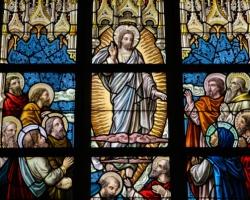On the day of Pentecost, the disciples' confusion turned to conviction. They burst from the room and began explaining the message and meaning of Jesus, and foreigners, visiting Jerusalem for the Feast of Pentecost, all understood in their respective languages. A crowd of thousands gathered in amazement, asking, "What can this mean?" (
Can you see Peter, the most vocal of the bunch, standing boldly before the crowd? Only weeks before, he had been the opposite of bold—afraid to identify himself with Jesus when the Romans arrested his Master. On this day, however, he spoke with an enlightened heart and mind in the power of God's Spirit, unashamedly proclaiming: "What you see this morning was predicted centuries ago by the prophet Joel: 'In the last days, God said, I will pour out My Spirit upon all people'" (
I think the model of the church in Acts should be the model of the church today. Our society today is very similar to the times in which the disciples found themselves. As they continued to meet, pray and observe the Feast of Pentecost, something extraordinary happened. The promised Holy Spirit descended on this band of 120 people who were in agreement in heart and mind. In that empowered moment, everything suddenly became clear to them. In a flash, they realized the real mission of Jesus was not to establish a government, but to transform the hearts and minds of people. It was not to solve society's problems from the top down, but from the bottom up, just as He did when He was among them. He healed, ministered, fed, taught and loved individual people with real needs. Those people loved Him in return. They had seen His transforming mission in action, but they had been too self-centered and self-absorbed in their own personal kingdom building to recognize it. Still, the power of prayer and the Holy Spirit changed all that.
For 10 days, Peter and the other followers of Jesus had been bathed in prayer. Now Peter went on to preach a convicting sermon about a new kingdom—a transformational kingdom movement of God ushered in by prayer and the Holy Spirit. Approximately 3,000 people were baptized into what became known as the body of Christ—His church. In striking contrast to the religious leaders and people of that day, these fresh new believers didn't just assemble behind closed doors and keep their religion to themselves. They lived out their newfound relationship with Christ through the power of God's Spirit. Rather than talking about Jesus, they behaved as He did. Rather than being religious in a temple, they were relevant to society. It is recorded that "a deep sense of awe came over them all, and the apostles performed many miraculous signs and wonders. All the believers met together constantly and shared everything they had. They sold their possessions and shared the proceeds with those in need. They worshiped together in the temple each day, met in homes for the Lord's Supper and shared their meals with great joy and generosity—all the while praising God and enjoying the good will of the people. Each day, the Lord added to their group those who were being saved" (
This transformational kingdom movement swept throughout Jerusalem and turned the current religion of that day on its ear. These bands of Christ followers proclaimed, "pure and lasting religion in the sight of God our Father means we must care for the orphans and widows in their troubles and refuse to let the world corrupt us" (




